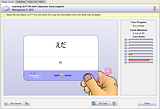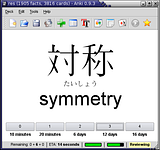For that reason, here is a list of the ways in which I have learned vocabulary in the past:
Flash cards
Predictable choice. Actually I really dislike them; the paper and pen ones that is. What I use is a combination of several electronic variations. I like this because you can easily fill ten minutes with a cram session, and keep track of your progress easily.
- Before You Know It.
 Basically just a simple program which asks you to memorise and then type words in your language and then the foreign language. Also supports sound, lets you make as many lists as you like and has a nice selection of hands to turn your cards for you.
Basically just a simple program which asks you to memorise and then type words in your language and then the foreign language. Also supports sound, lets you make as many lists as you like and has a nice selection of hands to turn your cards for you.
It's 50USD to buy, but the free version has a wide and great selection of vocab to get you started. The price-tag is a bit steep when compared to the following free alternatives.
- Smart.fm
 No longer free but still excellent site very similar to Before You Know It. Has loads of custom made lists to cover all major tests, as well as specific themes. Like BYKi it supports dozens of other languages too. Also has a couple of famous voice actors reading the words and sentences.
No longer free but still excellent site very similar to Before You Know It. Has loads of custom made lists to cover all major tests, as well as specific themes. Like BYKi it supports dozens of other languages too. Also has a couple of famous voice actors reading the words and sentences.
- SRS
 Spaced Repitition System. Smart.fm runs on this idea.
Spaced Repitition System. Smart.fm runs on this idea.
The program will show viewed vocab at timed intervals spaced by some mathematical formula to best help you remember them. The most popular one of these is Anki. Not much to look at, but useful. This is apparently scientifically proven to be the most effective method, providing you stick with it long-term.
The best thing about these three is that they save your progress. They also allow you to isolate your weaknesses. All three are also available on portable tools such as phones or iPods.
Of the three I think the first two are the best, mainly because they ask you to type your answers. This is an effective way of memorising the vocab, spelling and appearance of the target language, and interacting with your flashcards (as opposed to just shuffling them) is a high priority.
MP3s
I find these invaluable for retaining information. I used recorded notes to help me through university and continue to use them to help my Japanese along. The guy over at Tanos.co.uk made some MP3s of the vocab for the first two JLPT tests (1600 words or so). Even though he sounds like a bit of a gumper, I use and benefit from his recordings so here they are (.zip MP3 files):
Level N5 (easiest)
His site also features audio tests and links for all the levels, so I would recommend visiting.
I love this way of studying and encourage you to make some files of your own to listen to on your way to work etc.
Anime/manga
A good long-term way of learning and remembering vocab is to find it in context. If you like anime, watch it in Japanese with subtitles and write down anything you can clearly identify, either words or sentences. Very useful for solidifying knowledge. Similarly with manga in Japanese, write down the things you need to look up, or didn't quite understand before. Review when bored.
But beware, characters in anime and manga often use words/phrases in ways which normal people do not, so exercise caution when talking to Japanese friends or you may sound like a moe.
But beware, characters in anime and manga often use words/phrases in ways which normal people do not, so exercise caution when talking to Japanese friends or you may sound like a moe.
Do you have any other methods which you find productive? Please stick them in the comments field below.
No comments:
Post a Comment